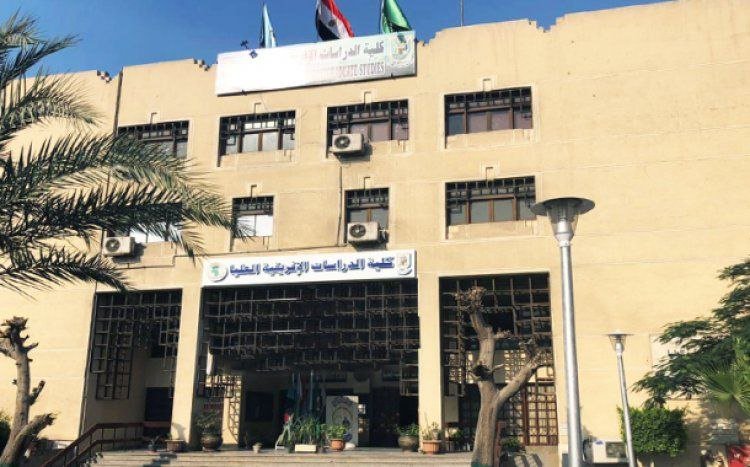Faculty of African Postgraduate Studies

Reviwed by: Wafaa El-houseiy
Translated by: Nour Elhoda Abdel Ghaffar
Faculty of African Postgraduate Studies.. One of Egypt's oldest knowledge edifices specialized in African studies
Some describe it as Egypt's gateway to Africa, and African students describe it as the "Home of Africans" in Egypt. Researchers and specialists in the field of African studies describe it as the destination for African students of science and culture coming from different backgrounds, nationalities, and origins.

The Faculty of African Postgraduate Studies dates back to 1947 when it was founded under the name of the Institute of Sudanese Studies. It was then affiliated with the Faculty of Arts, Cairo University, and included only two departments: History and Geography. Then it became an independent institute directly affiliated with the university in 1950, under the name of the Institute of African Studies. In 1970, a republican decree was issued to establish an independent institute for African research and studies, and then new departments were added. Four departments were established, namely the Department of Political and Economic Systems, the Department of Anthropology, the Department of African Languages, and the Department of Natural Resources; each of these main departments includes sub-departments. The Natural Resources Department, the scientific department in the college, which was established in 1971, includes five sub-departments covering the fields of natural resources in Africa, namely (land resources – vegetation resources - animal resources - water resources – and atmospheric resources), all of which are concerned with issues of natural resources development and environmental conservation.
As for the African Languages Department, which was established in 1970, it began to teach the Swahili and Hausa languages. Within the framework of development and keeping pace with changes, the Amharic language was added in 1993 to these two languages and these three languages became the main ones in the department later.
In 2002, the Luganda language was added to the languages of the department, bringing the total to four languages. Then, in 2006, the Fulani language came along becoming the fifth language to be added to the department.
The Mandinka language was included in 2009, then the Somali language was added in 2011, bringing the number of languages in the department to seven languages.
Established in 1970, the Department of Anthropology is one of the unique departments not only in Egypt but also in the Middle East and Africa. This is because of the different nature of the research disciplines studied. The department consists of three basic disciplines: cultural, social, and natural (biological) anthropology.
The faculty has a huge library specialized in all African affairs, containing thousands of reference sources, books, Arab and foreign periodicals, and hundreds of master's and doctoral theses. In addition, it has an office for the affairs of the university's African students, the African Information and Consultation Center, and many other administrative departments.

Since 1972, the Faculty has published the Journal of African Studies, which is a periodical scientific journal concerned with studies related to African affairs. It specializes in publishing serious and original scientific studies and research in the scientific fields related to African affairs with its various branches and fields.
The magazine aims to spread knowledge and raise awareness of African studies, as well as contribute seriously to enriching scientific research in the field of African studies, through the publication of research and studies in this field. It also aims to encourage scientific research in Egyptian, Arab, and African universities, and to provide an opportunity for Egyptian and African researchers to publish their scientific production. It also works to enhance the mechanisms of scientific cooperation between the faculty on one hand, and Egyptian, Arab, and African universities on the other.
The journal is interested in publishing scientific research related to African affairs in the fields of history, politics, economics, African languages and literature, geography, anthropology, natural resources, and other research fields related to African affairs, for researchers in universities and research institutions inside and outside Egypt. The research papers published in it are judged by specialists from various Egyptian, Arab, and African universities.
On December 3, 2018, the decision of His Excellency the Prime Minister was issued to transform the Institute of African Research and Studies into the Faculty of African Postgraduate Studies. This was in parallel with Egypt's preparations to assume the presidency of the African Union at the time, and the political leadership's belief in the importance of this ancient African monument in improving and consolidating Egyptian-African relations through knowledge, scientific research, and soft powers.
The Faculty of African Postgraduate Studies plays an important role in educating and raising the awareness of the local and African community on all African affairs and issues in cooperation with the competent authorities and civil society organizations through holding training courses and awareness seminars.
The Faculty of African Postgraduate Studies is – rightfully - Egypt's window and main gateway to the African continent, in addition to being the connecting factor linking Egypt with its African brotherly countries. Thousands of students from Egypt and various African countries graduated from the faculty, including those who held senior leadership positions in their countries after attaining knowledge from Egypt.
Sources
Faculty of African Postgraduate Studies Website.
